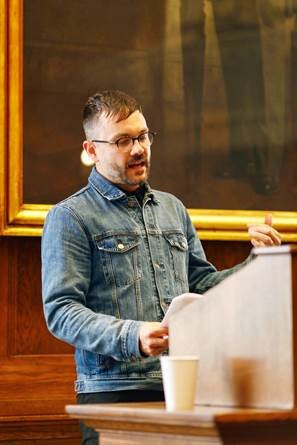 CONWAY, Ark. (November 5, 2019) — The Marshall T.
Steel Center for the Study of Religion and Philosophy this week will host
visiting philosopher and author Dr. Nicholas
Riggle for two public events at Hendrix College. Riggle, a professor of philosophy at the
University of San Diego whose book On Being Awesome: A United Theory of How Not to
Suck came out in 2017, will lead the Wednesday Afternoon Discussion, then
give a public talk Thursday evening. Both events are free and open to all;
descriptions are included below. There will be a limited giveaway of Riggle’s
book at the Thursday evening event.
CONWAY, Ark. (November 5, 2019) — The Marshall T.
Steel Center for the Study of Religion and Philosophy this week will host
visiting philosopher and author Dr. Nicholas
Riggle for two public events at Hendrix College. Riggle, a professor of philosophy at the
University of San Diego whose book On Being Awesome: A United Theory of How Not to
Suck came out in 2017, will lead the Wednesday Afternoon Discussion, then
give a public talk Thursday evening. Both events are free and open to all;
descriptions are included below. There will be a limited giveaway of Riggle’s
book at the Thursday evening event.
Dr. James Dow,
who serves as director of the Steel Center, associate professor of philosophy,
and chair of the neuroscience program at Hendrix College, says that Riggle’s
analysis of “awesomeness” and “suckiness” is based in the theory of social
openings: moments in which a person is given the option to take up or turn down
an opportunity to inspire others.
“A person is
awesome when they create social openings that enable others to pursue their
individuality in ways that create further social openings. For instance, a high
five is both aesthetically engaging and ethically good behavior; it creates a
social opening for others to have a sense of achievement and further attempt to
include others in community,” Dow said. “Riggle’s recent research has turned to
aesthetic conversations as a domain in which awesomeness could operate—that talking
about beauty, art, and aesthetic experience can create social openings.”
The Virtues of
Aesthetic Conversation: a Wednesday Afternoon Discussion, Nov. 6, 4 p.m.,
Ellis Hall
This is a
conversation about conversation. Our discussions about aesthetic matters are
complex, and we often end up in disagreements—about which TV shows are good and
why, which bands are best, how to decorate the apartment, what food to serve
and how to cook it, and so on. What are the virtues of aesthetic conversation?
What are we aiming at when we have such discussions?
Let’s Talk
About Beauty: Invitations and Aesthetic Discourse: Thursday,
Nov. 7 at 7 p.m. in Lecture Hall B of the Mills Center for Social Sciences; a
reception in the Mills Library follows.
Normative
discourse or talk of what we “ought to” or “should” do, is often said to be
distinctive in aiming at convergence. When we talk about what we ought to do,
think, believe, or feel, the thought goes, we aim to get everyone on the same
page and “converge” in our beliefs, feelings, plans, etc. While this might be
true of some normative domains, Riggle argues that it is not true of the
aesthetic. Like much moral discourse, typical aesthetic claims seem to express
feelings or have prima facie
imperatival force. But the conversational aims of aesthetic discourse are
distinctive. A symptom of this is the special type of speech act we typically
perform in aesthetic discourse. Understanding the speech act requires
understanding the force of aesthetic imperatives, and among the several options
a few stand out: demand, request, recommendation, and invitation. To adjudicate
between these options, Riggle presents an account of the normative character of
aesthetic discourse and argues that the invitation reading fares best. On this
view, typical aesthetic claims include invitations
to appreciate. It turns out that the
“end” of aesthetic discourse is community, in a sense, not convergence, and so
we should reject theories of aesthetic conversation that emphasize convergence.
For further
information on Riggle’s visit to the Hendrix campus, contact Dow (dow@hendrix.edu) or Tammy
Vanaman (vanamant@hendrix.edu).
About
Hendrix College
A
private liberal arts college in Conway, Arkansas, Hendrix College consistently
earns recognition as one of the country’s leading liberal arts institutions,
and is featured in Colleges That Change Lives: 40 Schools That Will
Change the Way You Think About Colleges. Its academic quality and rigor,
innovation, and value have established Hendrix as a fixture in numerous college
guides, lists, and rankings. Founded in 1876, Hendrix has been affiliated with
the United Methodist Church since 1884. To learn more, visit www.hendrix.edu.